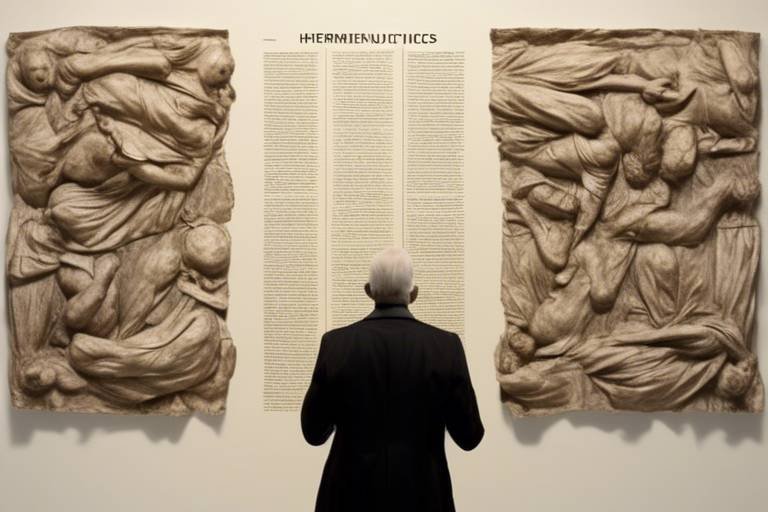Analyzing Transhumanist Philosophy
Transhumanist philosophy is not just a collection of ideas; it’s a bold vision for the future of humanity. As we stand on the brink of unprecedented technological advancements, transhumanism encourages us to rethink what it means to be human. It advocates for the enhancement of our physical and cognitive abilities through advanced technologies, pushing the boundaries of human potential. Imagine a world where we could overcome our biological limitations—sounds like science fiction, right? Well, for transhumanists, it’s a plausible future that we should actively pursue.
At its core, transhumanism is about improvement—improving our health, extending our lifespans, and even enhancing our intellect. But what does this mean for our identity as humans? Are we ready to embrace such a radical shift in our existence? These questions are at the heart of transhumanist debates. As we delve deeper into this philosophy, we uncover a landscape filled with promise, peril, and profound ethical dilemmas.
Transhumanism is often seen as a response to the challenges posed by modern life. With rapid advancements in fields like biotechnology, artificial intelligence, and nanotechnology, the potential for enhancing human capabilities is becoming more tangible. Yet, with great power comes great responsibility. The implications of these enhancements raise critical ethical questions that we must confront. Are we prepared to navigate the complexities of consent, inequality, and the very essence of what it means to be human?
As we explore the implications of transhumanist philosophy, we will consider its historical context, key thinkers who have shaped its evolution, and the technological advancements fueling its momentum. We will also examine the ethical considerations that arise from the pursuit of human enhancement, weighing the potential risks against the benefits. The future of humanity may very well depend on the choices we make today regarding our relationship with technology.
In the following sections, we will analyze the various aspects of transhumanism in detail, including its historical roots, prominent figures, and the societal implications of a future where human enhancement is not just possible but commonplace. By doing so, we aim to provide a comprehensive understanding of this fascinating and often controversial philosophy.
- What is transhumanism? - Transhumanism is a philosophical movement that advocates for enhancing the human condition through advanced technologies.
- Who are some key thinkers in transhumanism? - Prominent figures include Julian Huxley and Nick Bostrom, who have contributed significantly to the philosophy.
- What are the ethical concerns surrounding transhumanism? - Ethical issues include inequality, consent, and the potential loss of essential human qualities.
- How could transhumanism impact society? - It could reshape social structures, cultural norms, and the overall human experience.

Defining Transhumanism
Transhumanism is a fascinating and often controversial philosophical movement that champions the enhancement of the human condition through advanced technologies. Imagine a world where our biological limitations are not just acknowledged but actively transcended; that’s the essence of transhumanism. It’s a bold vision, one that stirs excitement and fear in equal measure. The roots of transhumanism can be traced back to the early 20th century, but it has gained significant traction in recent decades due to rapid technological advancements.
At its core, transhumanism advocates for the use of technology to improve human physical and cognitive abilities. This can include everything from genetic engineering to artificial intelligence and beyond. The idea is not just to prolong life but to enhance the quality of life, pushing the boundaries of what it means to be human. The movement envisions a future where humans can augment their bodies and minds, potentially leading to a post-human condition where individuals possess capabilities far beyond what we currently consider normal.
Some of the key principles of transhumanism include:
- Human Enhancement: Utilizing technology to improve physical and mental abilities.
- Life Extension: Developing methods to significantly prolong human life, potentially even achieving immortality.
- Post-Humanism: The idea that future humans may evolve into a new species with capabilities that far exceed those of current humans.
The vision of a post-human future raises several intriguing questions. What does it mean to be human? If we can enhance ourselves to the point of becoming something entirely new, will we lose our essence? These questions are not just philosophical musings; they are central to the transhumanist debate. As we stand on the brink of unprecedented technological advancements, the implications of transhumanism are profound, affecting everything from ethics to social structures.
In the next sections, we will delve deeper into the historical context of transhumanism, exploring how it has evolved over the years and the key thinkers who have shaped its trajectory. Understanding these elements will provide a clearer picture of how transhumanism fits into our current technological landscape and what it means for the future of humanity.

Historical Context
Transhumanism, as a philosophical movement, didn’t just pop up overnight; it is the result of centuries of thought and technological advancement. To truly grasp its significance, we need to take a stroll down memory lane and explore the historical backdrop that paved the way for this revolutionary ideology. The roots of transhumanism can be traced back to various intellectual currents, including the Enlightenment, which championed reason, science, and the potential for human progress. This era sparked a belief that humanity could improve itself through knowledge and innovation.
Fast forward to the 20th century, and we see the emergence of key figures who began to articulate the ideas that would eventually coalesce into what we now call transhumanism. Julian Huxley, a biologist and philosopher, was one of the first to advocate for the enhancement of the human species. His seminal essay, “Transhumanism,” published in 1957, laid the groundwork for the movement by suggesting that humans could evolve beyond their current physical and mental limitations through the application of science and technology.
Another pivotal moment in the history of transhumanism came with the rise of cybernetics and information technology in the latter half of the 20th century. The development of computers and the internet opened up new frontiers for human interaction and potential enhancement. This technological revolution not only changed the way we communicate but also how we perceive our own existence. It was during this time that thinkers like Nick Bostrom began to explore the ethical implications of these advancements, emphasizing the need for a philosophical framework to guide humanity through the uncharted waters of technological enhancement.
As we delve deeper into the historical context, it's important to recognize the influence of various cultural and scientific milestones that have shaped transhumanist thought. For instance:
| Year | Milestone | Influence on Transhumanism |
|---|---|---|
| 1957 | Julian Huxley's essay "Transhumanism" | Introduced the concept of enhancing human capabilities through science. |
| 1960s | Emergence of Cybernetics | Integrated technology and biology, leading to ideas of human-computer integration. |
| 1980s | Development of AI and Genetic Engineering | Opened discussions on the ethical implications of enhancing human intelligence and biology. |
| 2000s | Formation of the World Transhumanist Association | Provided a platform for transhumanist discourse and advocacy. |
As we can see from the table above, the historical context of transhumanism is rich and complex, filled with milestones that have directly influenced its evolution. Each of these developments has contributed to a growing awareness and acceptance of the idea that humanity can and should strive for enhancement. It’s like a tapestry woven from the threads of science, philosophy, and culture, each strand representing a different aspect of our quest to transcend our biological limitations.
Moreover, the dialogue surrounding transhumanism has evolved alongside societal changes. The rise of the internet and social media has facilitated discussions that were once confined to academic circles, allowing a broader audience to engage with these ideas. Today, we find ourselves at a crossroads where technology is advancing at an unprecedented pace. The implications of this rapid progress are profound, and understanding the historical context of transhumanism helps us navigate the ethical and philosophical dilemmas that lie ahead. Are we ready to embrace a future where the lines between human and machine blur? Only time will tell.
- What is transhumanism? Transhumanism is a philosophical movement that advocates for enhancing the human condition through advanced technologies.
- Who are the key figures in transhumanism? Notable figures include Julian Huxley and Nick Bostrom, who have significantly influenced transhumanist thought.
- What are the ethical concerns surrounding transhumanism? Ethical considerations include issues of inequality, consent, and the potential loss of essential human qualities.
- How does technology impact transhumanism? Technological advancements in fields like biotechnology and artificial intelligence are central to the transhumanist agenda, redefining human capabilities.

Key Thinkers
When diving into the fascinating world of transhumanism, it's crucial to acknowledge the who have shaped its philosophy and public perception. These individuals have not only contributed to the theoretical underpinnings of the movement but have also sparked conversations that challenge our understanding of what it means to be human. Among the most prominent figures are Julian Huxley and Nick Bostrom, each bringing unique perspectives that continue to influence discussions surrounding human enhancement and the future of humanity.
Julian Huxley, a biologist and philosopher, is often credited with coining the term "transhumanism" in the 1950s. His vision was nothing short of revolutionary; he imagined a world where humanity could transcend its biological limitations through science and technology. Huxley believed that by harnessing advanced technologies, we could improve our physical and mental capabilities, leading to a new era of human existence. He viewed this enhancement as a moral imperative, arguing that it is our duty to improve the human condition and address the challenges posed by overpopulation, disease, and environmental degradation. Huxley’s ideas have laid the groundwork for contemporary transhumanist thought, emphasizing the importance of evolution and progress.
On the other hand, we have Nick Bostrom, a modern-day philosopher who has made significant contributions to the ethical discussions surrounding transhumanism. Bostrom is particularly known for his work on the implications of emerging technologies and the potential risks they pose to humanity. He argues that while the enhancement of human abilities through technology could lead to incredible advancements, it also raises serious ethical concerns. For instance, Bostrom emphasizes the need for careful consideration regarding the accessibility of these technologies, as they could exacerbate social inequalities if only available to the wealthy. His thought-provoking questions challenge us to think critically about the future we are creating and the values we hold dear.
Both Huxley and Bostrom highlight the dual-edged sword of technological advancement. While they envision a future filled with possibilities, they also warn of the potential pitfalls. The dialogue they inspire encourages us to reflect on the ethical implications of our choices. Are we ready to embrace the changes that transhumanism proposes? Will we be able to navigate the moral complexities that come with enhancing our very nature?
To better understand the contributions of these thinkers, let's take a look at a brief comparison of their ideas:
| Thinker | Key Contribution | Core Idea |
|---|---|---|
| Julian Huxley | Coined the term "transhumanism" | Humanity can transcend biological limitations through science |
| Nick Bostrom | Ethical implications of emerging technologies | Need for careful consideration of enhancement accessibility and risks |
In conclusion, the insights provided by Huxley and Bostrom serve as a foundation for the ongoing conversation about transhumanism. Their thoughts encourage us to dream big while reminding us to tread carefully. As we navigate this uncharted territory, the questions they raise will continue to resonate, urging us to ponder the true essence of humanity in an age of rapid technological advancement.
- What is transhumanism? - Transhumanism is a philosophical movement that advocates for the enhancement of the human condition through advanced technologies.
- Who are the key thinkers in transhumanism? - Prominent figures include Julian Huxley and Nick Bostrom, each contributing unique perspectives and ethical considerations to the philosophy.
- What are the ethical implications of transhumanism? - Ethical concerns include the potential for inequality, consent issues, and the impact on the nature of humanity.
- How does technology play a role in transhumanism? - Technological advancements in areas like biotechnology and artificial intelligence are central to the transhumanist vision of enhancing human capabilities.

Julian Huxley’s Vision
Julian Huxley, often heralded as the father of transhumanism, had a profound vision for humanity's future that transcended the biological limitations imposed by our evolutionary past. His ideas, shaped by a blend of science, philosophy, and a deep-seated belief in progress, laid the groundwork for what we now consider transhumanist thought. Huxley argued that humanity should strive not just for survival but for enhancement, advocating for the use of technology to improve the human condition. This concept was revolutionary at the time and remains a cornerstone of transhumanist philosophy today.
In his seminal work, Huxley proposed that through advancements in science and technology, humans could achieve a state of being that he termed 'post-human.' This state would not only involve physical enhancements but also cognitive and emotional improvements. Imagine a world where we could enhance our intelligence, extend our lifespans, and even augment our emotional capacities—this was Huxley’s dream. He envisioned a future where humanity could harness the power of technology to overcome the limitations of our biological heritage, much like how a caterpillar transforms into a butterfly, emerging as something entirely new and extraordinary.
Huxley’s vision was not merely about individual enhancement; it encompassed a broader societal transformation. He believed that by improving human capabilities, society as a whole could progress towards a more enlightened and harmonious existence. He envisioned a world where:
- Education would evolve, utilizing technology to make learning more accessible and effective.
- Health would be significantly improved, with diseases eradicated through advanced medical interventions.
- Social structures would be redefined, aiming for a more equitable distribution of resources and opportunities.
However, Huxley's ideas were not without their critiques. Some contemporaries questioned the ethical implications of such enhancements, fearing that they could lead to a society divided between the 'enhanced' and the 'unenhanced.' Huxley himself acknowledged these concerns but remained optimistic about humanity's ability to navigate the moral complexities of technological advancement. He believed that with careful thought and ethical considerations, society could harness these advancements for the greater good.
Ultimately, Julian Huxley's vision of a transhumanist future serves as a beacon of hope and a call to action. His ideas challenge us to rethink what it means to be human and to consider the possibilities that lie ahead. As we stand on the brink of unprecedented technological advancements, Huxley’s thoughts remind us that the journey towards enhancement is not just about the technology itself but about the values we choose to uphold as we embrace our future.
- What is transhumanism? Transhumanism is a philosophical movement advocating for the enhancement of the human condition through advanced technologies.
- Who was Julian Huxley? Julian Huxley was a prominent biologist and philosopher who is often considered the father of transhumanism.
- What are the ethical concerns surrounding transhumanism? Ethical concerns include potential inequality, consent issues, and the fundamental nature of humanity.

Nick Bostrom’s Contributions
Nick Bostrom is one of the most influential contemporary thinkers in the realm of transhumanism, and his work has significantly shaped our understanding of the ethical implications surrounding emerging technologies. Born in Sweden, Bostrom's academic journey led him to the University of Oxford, where he founded the Future of Humanity Institute. This institute serves as a hub for interdisciplinary research, focusing on the long-term impact of technological advancements on humanity. Bostrom’s contributions are not just theoretical; they challenge us to think critically about the future we are crafting with our innovations.
One of Bostrom’s most notable concepts is the idea of “superintelligence”. In his widely acclaimed paper, he outlines the potential risks associated with creating intelligent machines that could surpass human intelligence. He argues that if we do not approach the development of AI with caution, we may inadvertently create entities that could act in ways that are detrimental to humanity. This notion has sparked extensive debate within both academic and technological communities, urging developers and policymakers to consider the ethical ramifications of their work.
Moreover, Bostrom has delved deeply into the discussion of “moral enhancement”. He posits that as we enhance our physical capabilities through technology, we should also consider enhancing our moral capacities. This raises a fundamental question: should we use technology to improve not just our bodies but also our minds and ethical frameworks? Bostrom believes that moral enhancement could help mitigate the risks posed by superintelligent AI, creating a more harmonious relationship between humans and machines.
In addition to these concepts, Bostrom has contributed to the discourse on “existential risks”. He emphasizes the importance of understanding and addressing the potential threats that could jeopardize humanity's future. These risks could stem from various sources, including nuclear war, bioengineering disasters, and uncontrolled AI development. By identifying and analyzing these risks, Bostrom aims to promote a proactive approach to ensuring the survival and flourishing of humanity.
To summarize Bostrom’s contributions, we can look at the following key areas:
- Superintelligence: Advocating for cautious development of AI to prevent potential threats to humanity.
- Moral Enhancement: Exploring the need for ethical improvements alongside technological advancements.
- Existential Risks: Identifying and addressing risks that could threaten human existence.
Bostrom's work is crucial in shaping the future of transhumanism. His ideas challenge us to think beyond immediate technological benefits and consider the broader implications of our actions. As we stand on the brink of unprecedented advancements, his insights serve as a guiding light, urging us to navigate the complex landscape of ethics, technology, and humanity with care and foresight.

Technological Advancements
In the realm of transhumanism, serve as the backbone of its philosophy, promising to revolutionize what it means to be human. Imagine a world where our biological limitations are not just accepted but actively challenged and redefined through cutting-edge technologies. This vision is not merely science fiction; it is a rapidly approaching reality, driven by innovations in biotechnology, artificial intelligence, and nanotechnology. Each of these fields is contributing to a future where human capabilities could be significantly enhanced, paving the way for a post-human existence.
Let's take a closer look at these advancements and their implications:
| Technology | Description | Potential Impact |
|---|---|---|
| Biotechnology | The manipulation of living organisms to enhance health and longevity. | Could lead to gene editing, disease eradication, and lifespan extension. |
| Artificial Intelligence | The development of machines that can perform tasks typically requiring human intelligence. | May augment human decision-making, creativity, and even emotional understanding. |
| Nanotechnology | The engineering of matter at the molecular level. | Has the potential to create new materials, improve medical therapies, and enhance cognitive functions. |
These technologies are not just theoretical; they are already being implemented in various sectors, from healthcare to manufacturing. For instance, biotechnology has led to breakthroughs in gene therapy, allowing scientists to correct genetic disorders at their source. Similarly, advancements in artificial intelligence are enabling machines to learn and adapt, making them invaluable in tasks ranging from data analysis to personalized medicine.
However, the integration of these technologies into our lives does not come without its challenges. As we push the boundaries of what is possible, we must also consider the ethical implications of such enhancements. Questions arise: Who gets access to these technologies? Will they create a new class divide between those who can afford enhancements and those who cannot? These are not just hypothetical scenarios; they are real concerns that society must address as we move forward.
Moreover, the intersection of nanotechnology and health care is particularly intriguing. Imagine tiny robots navigating through our bloodstream, repairing damaged cells or delivering medications precisely where they are needed. This kind of innovation could not only change the way we think about health but also redefine our understanding of the human body itself.
In conclusion, the technological advancements underpinning transhumanism hold immense potential to enhance the human experience. As we continue to innovate, it is crucial to engage in thoughtful discussions about the implications of these technologies. After all, the future we envision today will shape the world of tomorrow.
- What is transhumanism? Transhumanism is a philosophical movement that advocates for the enhancement of the human condition through advanced technologies.
- What are some key technologies associated with transhumanism? Key technologies include biotechnology, artificial intelligence, and nanotechnology.
- What are the ethical concerns surrounding transhumanism? Ethical concerns include issues of inequality, consent, and the potential loss of essential human qualities.
- How can advancements in technology affect society? These advancements could lead to significant changes in social structures, cultural norms, and the overall human experience.

Ethical Considerations
As we plunge deeper into the world of transhumanism, the ethical considerations surrounding this movement become ever more pressing. It's like standing at the edge of a vast ocean of possibilities, where each wave represents a new technological advancement that could reshape humanity. But with great power comes great responsibility, and we must ask ourselves: what are the moral implications of enhancing our very nature? The pursuit of human enhancement raises significant questions about inequality, consent, and the essence of what it means to be human.
One of the most significant ethical dilemmas is the potential for inequality. Imagine a future where only the wealthy can afford enhancements that could lead to superior intelligence, longevity, or physical prowess. This could create a society divided not just by wealth but by capability, leading to a new class of "enhanced" individuals who may dominate over those who remain "natural." The gap between the haves and have-nots could widen, resulting in a societal structure that is not only inequitable but also deeply fragmented.
Furthermore, the question of consent looms large. As technologies advance, who decides what enhancements are appropriate? If children are enhanced before they can give informed consent, are we infringing on their autonomy? This concern is compounded by the possibility that societal pressures might compel individuals to enhance themselves in order to keep up with peers, creating a cycle where enhancement becomes a necessity rather than a choice. In essence, we must navigate the murky waters of personal freedom versus societal expectation.
The nature of humanity itself is also up for debate. What happens when we start altering our cognitive and physical capabilities? Are we still the same species, or do we become something entirely different? This philosophical conundrum raises questions about identity and the human experience. For instance, if we enhance our memories or cognitive functions, do we risk losing the richness of human emotion and experience that comes from imperfection? Are we, in essence, trading away our humanity for the sake of progress?
To illustrate these ethical considerations, let's consider some potential risks and benefits associated with transhumanist technologies:
| Risks | Benefits |
|---|---|
| Social Inequality: Enhanced individuals may dominate unenhanced ones. | Improved Health: Potential for disease eradication and increased lifespan. |
| Loss of Autonomy: Individuals may feel pressured to enhance themselves. | Cognitive Enhancement: Increased intelligence and problem-solving capabilities. |
| Dehumanization: Altering our nature could result in a loss of essential human qualities. | Enhanced Experiences: New ways to experience life through augmented realities. |
As we ponder these ethical considerations, it becomes clear that the path forward is fraught with challenges. We must engage in open dialogues about the implications of transhumanism, ensuring that we prioritize ethical frameworks that promote equity, consent, and the preservation of our shared humanity. The future of humanity may very well depend on how we navigate these complex waters.
- What is transhumanism? Transhumanism is a philosophical movement that advocates for the enhancement of the human condition through advanced technologies.
- What are the main ethical concerns regarding transhumanism? Key concerns include social inequality, loss of autonomy, and the potential dehumanization of individuals.
- How could transhumanism affect society? It could lead to a divide between enhanced and unenhanced individuals, impacting social structures and cultural norms.

Risks and Benefits
When we dive into the world of transhumanism, it's like opening a Pandora's box filled with both incredible possibilities and daunting risks. On one hand, the potential benefits of enhancing human capabilities through technology are nothing short of revolutionary. Imagine a world where diseases are eradicated, aging is slowed, and cognitive abilities are significantly enhanced. This vision is not just a sci-fi fantasy; it is a tangible goal for many transhumanists. However, with great power comes great responsibility. The risks associated with these advancements are equally significant and warrant serious contemplation.
One of the most compelling benefits of transhumanism is the promise of improved health and longevity. Advances in biotechnology, such as gene editing and regenerative medicine, could lead to breakthroughs that allow us to overcome genetic disorders and repair damaged tissues. For instance, CRISPR technology has already shown the potential to eliminate certain hereditary diseases. This could transform healthcare as we know it, shifting the focus from treatment to prevention.
Moreover, consider the cognitive enhancements that artificial intelligence (AI) and neural interfaces might bring. These technologies could augment our mental capacities, enabling us to learn faster, think more clearly, and make better decisions. The implications for education and workforce productivity are staggering. However, we must also ask ourselves: at what cost? Will these enhancements be accessible to everyone, or will they create a new class of "superhumans" that exacerbate existing inequalities?
In addition to health and cognitive benefits, transhumanism also offers the possibility of extending human experiences through virtual reality and augmented reality technologies. These innovations could allow us to explore new realms of creativity, experience life in ways we never thought possible, and connect with others across the globe in immersive environments. Yet, this raises ethical concerns about the nature of reality and the authenticity of our experiences. Are we risking our humanity by immersing ourselves in virtual worlds, potentially losing touch with the physical world and our fundamental human connections?
Now, let’s not ignore the potential risks. The ethical implications of human enhancement are profound. For example, as we enhance ourselves, we must consider the concept of consent. Who gets to decide what enhancements are acceptable? If enhancements become a societal norm, will individuals feel pressured to conform? This could lead to a situation where the essence of personal choice is compromised, creating a divide between those who choose to enhance and those who do not.
Furthermore, the risk of dehumanization looms large. Critics argue that as we prioritize technological enhancement, we may inadvertently undermine the qualities that make us human. Our emotions, our struggles, and our imperfections are what define our humanity. By striving for an idealized version of ourselves, are we not risking the loss of what makes life rich and meaningful?
Lastly, we have to consider the societal implications of widespread transhumanist technologies. The gap between the enhanced and the unenhanced could lead to social unrest and conflict. Imagine a society where some individuals possess extraordinary abilities while others are left behind. This could create a new form of discrimination, where those without enhancements are marginalized. The very fabric of our society could be at stake, leading us to question what it truly means to be human in an age of rapid technological advancement.
In conclusion, while the benefits of transhumanism are enticing and could lead to a brighter future, we must tread carefully. The risks are substantial and complex, requiring thoughtful discourse and ethical considerations. As we stand on the brink of this new frontier, it is crucial that we engage in open discussions about the implications of our choices today for the humanity of tomorrow.
- What is transhumanism? Transhumanism is a philosophical movement that advocates for enhancing the human condition through advanced technologies, aiming for a post-human future.
- What are the main benefits of transhumanism? Key benefits include improved health, enhanced cognitive abilities, and the potential for new experiences through virtual and augmented reality.
- What risks are associated with transhumanism? Risks include ethical concerns about consent, the possibility of dehumanization, and societal implications like inequality and discrimination.
- How does transhumanism affect our understanding of humanity? Transhumanism challenges traditional notions of what it means to be human, raising questions about identity, choice, and the essence of human experience.

Critiques of Transhumanism
Transhumanism, while celebrated by many as a beacon of hope for the future, is not without its critics. The movement's ambitious goals of enhancing human capabilities through technology raise profound questions about our identity, ethics, and societal structures. Critics argue that the pursuit of such enhancements may lead to a range of negative consequences, including the potential for dehumanization and the erosion of individuality. As we explore these critiques, it becomes clear that the implications of transhumanism extend far beyond the realm of science and technology; they touch the very essence of what it means to be human.
One of the most significant concerns raised by critics is the fear of dehumanization. As we increasingly rely on technology to augment our physical and cognitive abilities, there is a worry that we may lose the qualities that make us distinctly human. What happens when we prioritize technological enhancement over our innate human values? This question looms large in the minds of those skeptical of transhumanism. For instance, if we can enhance our intelligence or physical strength through artificial means, will we still value the unique experiences and imperfections that define our humanity? Critics argue that such a shift could lead to a society where human qualities like empathy, compassion, and creativity are overshadowed by a focus on efficiency and performance.
Moreover, the societal implications of transhumanism are profound. The movement could exacerbate existing inequalities, as access to enhancement technologies may be limited to the wealthy, creating a new class of 'enhanced' individuals. This scenario raises ethical questions about consent and equity. If only a portion of the population can afford enhancements, what does that mean for social cohesion? Will we see a divide between the 'enhanced' and the 'unenhanced,' leading to a society stratified not just by wealth, but by biological capabilities? These are critical considerations that cannot be overlooked.
In addition to these societal concerns, the philosophical dilemmas posed by transhumanism are equally troubling. The movement challenges our understanding of identity and what it means to be human. If we can alter our biology and consciousness, how do we define ourselves? Are we still the same individuals if our memories, thoughts, and even our physical forms are modified? Critics argue that this could lead to a crisis of identity, where the essence of who we are becomes diluted in a sea of technological enhancements. The fear is that we might lose the very core of our humanity in our quest for improvement.
In summary, while transhumanism offers exciting possibilities for the future, it also brings with it a host of critiques that challenge its underlying assumptions. The concerns about dehumanization, societal inequality, and the philosophical implications of altering our humanity are significant. As we stand on the brink of a technological revolution, it is essential to engage with these critiques thoughtfully. Only through careful consideration of these issues can we hope to navigate the complex landscape of human enhancement responsibly.
- What is transhumanism? Transhumanism is a philosophical movement that advocates for the enhancement of the human condition through advanced technologies.
- What are the main critiques of transhumanism? Critics argue that transhumanism may lead to dehumanization, exacerbate social inequalities, and challenge our understanding of identity.
- How might transhumanism affect society? The movement could create divisions between those who can afford enhancements and those who cannot, leading to significant societal implications.
- What ethical concerns are associated with transhumanism? Ethical concerns include issues of consent, equity, and the potential loss of essential human qualities.

Dehumanization Concerns
The rise of transhumanism has sparked a whirlwind of debates, particularly surrounding the idea of dehumanization. Critics of the movement often express concerns that as we increasingly rely on technology to enhance our physical and cognitive capabilities, we may inadvertently strip away the very qualities that make us human. Imagine a world where human emotions, empathy, and spontaneity are overshadowed by enhanced intellect and physical prowess. Is this the future we truly desire?
At the heart of the dehumanization argument is the fear that technological enhancement could lead to a society where individuality is sacrificed on the altar of progress. When everyone has access to the same enhancements—be it genetic modifications or cognitive boosters—what happens to our unique identities? Will we become mere products of our enhancements, losing the quirks and imperfections that make us who we are? This concern is not just philosophical; it has profound implications for how we view ourselves and our relationships with others.
Moreover, critics argue that the pursuit of enhancement could lead to a new form of elitism. Those who can afford the latest technologies may gain advantages over those who cannot, creating a societal divide that echoes the historical disparities we’ve seen throughout human history. This potential for a two-tiered society raises ethical questions: Should we prioritize technological advancement at the expense of social equity? Are we willing to accept a future where only the wealthy can afford to be “better” humans?
To illustrate these concerns, consider the following table that outlines the potential risks and benefits of transhumanist technologies:
| Aspect | Potential Risks | Potential Benefits |
|---|---|---|
| Social Equity | Increased inequality; elitism | Wider access to health and longevity |
| Identity | Loss of individuality; homogenization | Enhanced personal capabilities |
| Ethics | Consent issues; moral dilemmas | Advancements in medicine and quality of life |
As we navigate these complex waters, it’s crucial to engage in open discussions about the implications of transhumanism. Are we ready to embrace a future where our very essence is at stake? The conversation about dehumanization is not just about technology; it’s about what it means to be human in an age of rapid change. As we stand on the brink of this new frontier, we must ask ourselves: What do we value more—our humanity or our enhancements?
- What is transhumanism? Transhumanism is a philosophical movement that advocates for enhancing the human condition through advanced technologies.
- What are the main concerns regarding dehumanization? Critics worry that technological enhancements may lead to a loss of individuality, increased social inequality, and ethical dilemmas.
- How can society address the risks of transhumanism? Open discussions, ethical guidelines, and equitable access to technologies can help mitigate the risks associated with transhumanism.
- Are there benefits to transhumanist technologies? Yes, potential benefits include improved health, longevity, and enhanced cognitive and physical abilities.

Societal Implications
The societal implications of transhumanism are as vast and intricate as the technologies it seeks to promote. Imagine a world where humans are not just living beings but enhanced entities, capable of feats that were once confined to the realm of science fiction. This transformation could lead to a fundamental shift in how we perceive ourselves and our relationships with others. But what does this mean for our social structures, cultural norms, and the very fabric of human experience?
At its core, transhumanism challenges the traditional boundaries of what it means to be human. As we integrate advanced technologies into our lives, the lines between human and machine blur. This could result in a new social hierarchy based on access to enhancement technologies. For instance, those who can afford cognitive enhancements or physical augmentations may find themselves in positions of greater power and influence, while those who cannot may be left behind, creating a chasm of inequality.
Moreover, the implications extend beyond mere economic disparities. As people begin to enhance their cognitive abilities, there could be a shift in educational systems and workplace dynamics. Imagine a classroom where every student is equipped with augmented intelligence—traditional teaching methods may become obsolete, and the very concept of learning could be redefined. This raises the question: will education cater to the enhanced, or will it seek to uplift all students equally?
Additionally, the cultural norms that govern our interactions may undergo significant changes. The idea of identity could evolve as individuals choose to alter their physical and mental attributes. Consider the implications for personal relationships—how will we define love, friendship, and family when our partners or children may not be entirely 'human' in the traditional sense? The potential for enhanced individuals to have vastly different experiences and perspectives could enrich our society, but it could also lead to misunderstandings and conflicts.
Furthermore, the ethical considerations surrounding consent and autonomy become increasingly complex. With the advent of enhancement technologies, we must grapple with questions like: Who gets to decide what constitutes an enhancement? Are we enhancing for the sake of progress, or are we inadvertently creating a new form of coercion? The societal implications are profound, and we must navigate these waters carefully to avoid the pitfalls of a divided society.
As we stand on the brink of this new era, it is crucial to engage in discussions about the future we want to create. Will we embrace transhumanism as a path to greater potential, or will we resist it in fear of losing our humanity? The answers to these questions will shape the world of tomorrow and determine the legacy we leave for future generations.
- What is transhumanism? Transhumanism is a philosophical movement that advocates for enhancing the human condition through advanced technologies.
- What are the potential societal impacts of transhumanism? Transhumanism could lead to new social hierarchies, changes in educational systems, and evolving cultural norms regarding identity and relationships.
- How might transhumanism affect inequality? Access to enhancement technologies could create disparities between those who can afford enhancements and those who cannot, leading to a new form of inequality.
- What ethical concerns are associated with transhumanism? Ethical concerns include issues of consent, autonomy, and the potential loss of essential human qualities as we prioritize technological enhancement.
Frequently Asked Questions
-
What is transhumanism?
Transhumanism is a philosophical movement that advocates for the enhancement of the human condition through advanced technologies. It envisions a future where humans can transcend their biological limitations, leading to improved physical and cognitive abilities.
-
Who are the key thinkers in transhumanism?
Prominent figures in transhumanist thought include Julian Huxley, who envisioned a future of enhanced humanity, and Nick Bostrom, known for his work on the ethical implications of emerging technologies. Their ideas have significantly shaped the philosophy and public perception of transhumanism.
-
What are some examples of technological advancements related to transhumanism?
Current advancements in biotechnology, artificial intelligence, and nanotechnology are central to transhumanism. These technologies have the potential to redefine human capabilities, enhancing everything from health to cognitive functions.
-
What ethical considerations arise from transhumanism?
The pursuit of transhumanist goals raises important ethical questions, such as issues of inequality, consent, and the very nature of what it means to be human. It invites debates on whether enhancements should be available to all or if they could create a divide.
-
What are the potential risks and benefits of transhumanist technologies?
Transhumanist technologies can offer significant benefits, such as improved health and extended lifespans. However, they also pose risks, including societal impacts, ethical dilemmas, and concerns about the loss of individuality and essential human qualities.
-
What critiques does transhumanism face?
Critics argue that transhumanism may lead to dehumanization and a loss of individuality. They express concerns that prioritizing technological enhancement over human values could fundamentally alter the essence of what it means to be human.
-
How might transhumanism affect society?
The societal implications of transhumanism are profound, potentially reshaping social structures and cultural norms. As technology advances, it could redefine the overall human experience and challenge our current understanding of community and individuality.



















